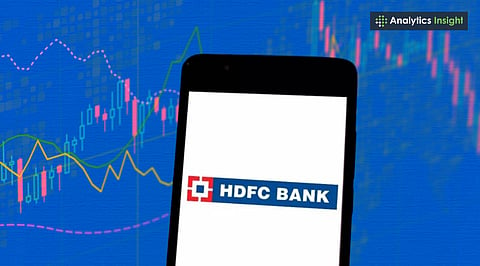

The HDFC Bank Share Price reflects strong activity in today’s market session. Shares of HDFC Bank, India’s largest private sector lender, declined on Tuesday as the stock adjusted for its much-awaited 1:1 bonus issue. The stock slipped 1.30% to Rs 969.30 in morning trade on the BSE, reflecting the price adjustment mechanism that comes into play once a company issues bonus shares.
The lender had announced its maiden bonus issue last month alongside its quarterly earnings. Under the 1:1 bonus ratio, investors will receive one additional share for every fully paid-up equity share held. The record date for eligibility is August 26, 2025, meaning shareholders on record as of today will receive the bonus shares.
Many retail investors continue to add HDFC Bank Shares to their portfolios. This marks the first bonus issue in HDFC Bank’s more than three-decade history. The bank has previously undertaken stock splits in 2011 (1:5 split of a Rs 10 share into five shares of Rs 2 each) and in 2019 (1:2 split of a Rs 2 share into two shares of Rs 1 each).
Analysts are evaluating the HDFC Bank Stock Performance over the past quarter. On Tuesday, the stock opened at Rs 979.50, sharply lower than Monday’s close of Rs 1,964.10, a direct outcome of the bonus adjustment.
Intraday, HDFC Bank traded between a high of Rs 985.70 and a low of Rs 968.00. Market capitalization stood at Rs 14.88 lakh crore, with trading volumes exceeding 27.78 lakh shares worth Rs 270.27 crore by mid-morning.
Also Read: HDFC Bank Share Price Drops to Rs. 1,962.10, Down 1.46% Amid Volatility
A bonus issue doubles the shares outstanding and makes a corresponding adjustment to the market price, leaving the overall value of the investor holdings unchanged. HDFC Bank continues to strengthen its position as one of India’s leading private lenders.
The move is likely to improve liquidity and will make the stock more affordable to a wider investor base. The HDFC Bank Investment Outlook remains positive with long-term growth potential.
Market experts remain optimistic about the bank’s long-term performance. According to Prashanth Tapse, Senior VP (Research) at Mehta Equities, the ex-bonus adjustment is “an accounting exercise” and does not impact fundamentals. He added that liquidity generally improves post-bonus, often boosting trading momentum.
Santosh Meena, Head of Research at Swastika Investmart, emphasized HDFC Bank's exemplary performance. Over the past five years, the bank has achieved a profit CAGR of 21%, maintained a dividend payout ratio of around 23% and achieved 16% median sales growth over the past ten years.
He further stated that the bonus issue, together with a special dividend, demonstrates the bank's shareholder-friendly approach and robust capital position.
Short-term volatility could continue as many foreign institutional investors (FIIs) are currently selling and creating margin pressure. Still, analysts remain bullish on the stock in the long term due to reliable earnings growth, solid asset quality, and strong corporate governance.
Despite the day’s decline, HDFC Bank has gained 15% in the past six months and 18% over the last year. Over two years, the stock is up 25%, and in the past five years, it has delivered an impressive 74% return.
